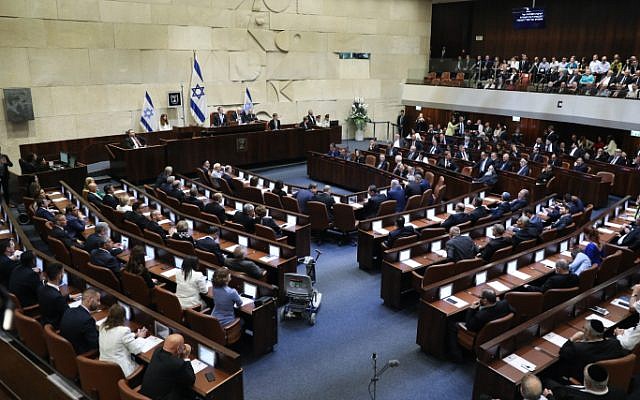Motion passes 64 to 44 as lawmakers move one step closer to new national vote, mere weeks after previous one

The Knesset plenum on Monday night moved one step closer towards dissolving the 21st Knesset less than a month since it was sworn in, with MKs approving in its first reading a bill to disband the legislature amid a coalition-building crisis.
Sixty-four MKS voted for the motion, with 44 voting against and one abstaining.
The bill must now be passed in its second and third readings for new elections to be called. Those readings will likely be held by Wednesday night if no agreements are reached: the deadline for Prime Minister Benjamin Netanyahu to cobble together a Knesset majority.
The prospective date for the new national poll is September 17, though that date could yet change.
On Monday last-ditch coalition talks between Netanyahu and Yisrael Beytenu leader Avigdor Liberman failed to produce a breakthrough.
While Netanyahu prefers a new election if he cannot form a coalition, opposition parties would rather the president task on of their own with attempting to form a government.
This led to the odd sight of right-wing lawmakers voting for fresh elections, weeks after triumphantly declaring victory in the April 9 vote, while opposition lawmakers defeated in the polls voted to keep the parliament intact.
Holding two elections at such a short interval would be unprecedented in Israel, and there have been concerns over the cost and prolonged political paralysis that would result.
While the bill to dissolve the Knesset breezed past its preliminary and first readings, Netanyahu may face a tougher battle getting it through its final readings, as some of his party’s legislators fear for their political future.

With Moshe Kahlon’s Kulanu crashing to four seats in the most recent election, it is all but certain to merge with Likud if new elections are called. This could push some of Likud’s backbenchers to unrealistic spots on the party’s roster, and Netanyahu would now be calling on them to effectively be voting to kick themselves out of parliament. Though party discipline held in Monday’s votes, the premier could face something of an internal revolt at crunch time.
Blue and White, which has vowed that it will not join a government led by Netanyahu, is tied with Likud as the largest party in the Knesset. On Monday, its leader, Benny Gantz, said that if Netanyahu cannot form a government, he should be given a chance.
The centrist party has no clear path to forming a government, as it has ruled out an alliance with Arab lawmakers, and ultra-Orthodox and right-wing parties have said they will not join a Blue and White government.
Blue and White, along with the other opposition parties Labor and Meretz, voted against unraveling the Knesset in the preliminary vote.
Netanyahu has yet to ink a deal with any of his prospective partners, and progress has stalled amid an impasse between the secular Yisrael Beytenu party and ultra-Orthodox parties on the question of a bill regulating the military draft among the ultra-Orthodox.
Yisrael Beytenu leader Liberman has repeatedly said he backs Netanyahu for prime minister, but will only join the government if there is a commitment to pass, unaltered, a bill regulating the draft of ultra-Orthodox men into the army. The bill is opposed by ultra-Orthodox parties, which want to soften its terms. Netanyahu needs Yisrael Beytenu and both the Knesset’s ultra-Orthodox parties to form a majority government.
Likud won 35 seats in the April 9 election. The two ultra-Orthodox parties, Shas and United Torah Judaism, each won eight seats. Kahlon’s center-right Kulanu won four. And the hawkish Union of Right-Wing Parties won five. Together, these parties hold 60 seats in the 120-member Knesset, and Netanyahu also needs the secular, right-wing Yisrael Beytenu party, with its five seats, for a majority.
Netanyahu on Monday night upped pressure on Liberman to compromise, saying in a statement to the press there was “no reason” to go to new elections and “paralyze the country for another half a year.”

He said the specific dispute over the ultra-Orthodox draft bill was a matter of “cosmetics” and “semantics” that by no means justified a resort to new elections. “You don’t hold elections over cosmetics,” he said.
“I hope the benefit of the state will trump any other consideration or interest,” he added.
Netanyahu faces a Wednesday night deadline to form a coalition. But should he fail to build a coalition by then or dissolve the Knesset, the prime minister may be able to buy himself another 14 more days, exercising a never-before-used legal provision, analysts say.
As the deadline expires — and should the Knesset remain intact — Rivlin would be able to task another lawmaker with forming the government. But since the prevailing assessment is that nobody else would be able to secure the 61-seat majority needed, that scenario too would likely lead to fresh Knesset elections, months after the April 9 vote.
As reported by The Times of Israel
